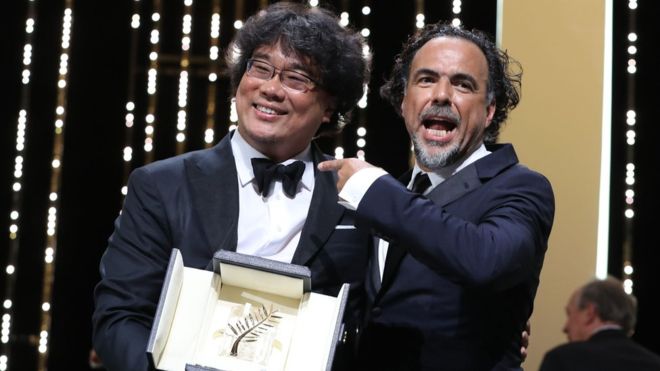Cannes: South Korean director Bong Joon Ho’s ‘Parasite’, an audaciously original take on the sharp rich-poor divide and its shocking repercussions in the city of Seoul, bagged the Palme d’Or at the 72nd Cannes Film Festival Saturday evening, while three of the four films by women directors in this year’s Competition also ended up among the awards.
Bong Joon Ho is the second Asian director in succession to win the Palme d’Or, after Japan’s Hirokazu Kore-eda, who won last year for the film ‘Shoplifters.
Bong Joon Ho received the festival’s coveted top prize from French cinema icon Catherine Deneuve at a closing ceremony that also saw the Belgian brothers, Jean-Pierre and Luc Dardenne, taking home the best director’s prize for Le Jeune Ahmed (Young Ahmed), the story of a boy radicalised by a local imam.
The jury headed by Mexican director Alejandro Gonzalez Inarritu awarded the Grand Prix, the festival’s runners-up prize, to first-time director Mati Diop’s Atlantique, an individualistic take on life’s struggles in Senegal, Atlantique. The award was presented to her by Hollywood star Sylvester Stallone.
The Jury Prize was shared by two films — French-Malian Ladj Ly’s Les Miserables, inspired by the 2005 riots in a Paris neighbourhood, and the Brazilian entry Bacurau, directed by Kleber Mendonce Filho and Juliano Dornelles.
Palestinian director Elia Suleiman’s It Must Be Heaven won a special mention from Inarritu’s jury. Portrait of a Lady on Fire, directed by Celine Sciamma and one of the best reveiewed films in Cannes this year, a Cannes Competition first-timer, fetched her the best screenplay award.
British actress Emily Beecham earned the best actress prize for her performance in Austrian director Jessica Hausner’s English-language film Little Joe.
Antonio Banderas drew huge applause on being named the best actor for the role of filmmaker in Pedro Almodovar’s self-reflexive Pain and Glory. He received the trophy from Chinese actress Zhang Ziyi.
Our Mothers, a film by Guatemalan director Cesar Diaz, won the Camera d’Or for the best debut film in Cannes this year. The film was part of the parallel Critics’ Week.
The Prix Un Certain Regard, announced on Friday evening, went to Brazilian writer-director Karim Ainouz’s The Invisible Life of Euridice Gusmao, a sweeping drama about two estranged sisters in 1950s Rio de Janeiro.
The Un Certain Regard jury was headed by Lebanese director Nadine Labaki, who won the Jury Prize last year for Capharnaum in the festival’s main Competition.
In his acceptance speech, Ainouz drew attention to the current turmoil in his home country. Brazil is going through something very, very hard and it has got to do with intolerance, he said.
The Jury Prize in the sidebar was won by French-born Spanish filmmaker Oliver Laxe’s Fire Will Come, which is a powerful and slow-burning look at rural life faced with extinction in the Galician mountains.
The festival’s FIPRESCI jury picked Elia Suleiman’s It Must be Heaven, a characteristically personal, absurdist take on the state of being a man without a country to call his own, for its International Critics’ Prize for a film from the Competition section. For Un Certain Regard, it gave the prize to new Russian sensation Kantemir Balagov’s Beanpole for ‘its highly aesthetic use of the medium of cinema and its unique story of post-war trauma’.
FIPRESCI also gave a prize to The Lighthouse, directed by Robert Eggers. The film, which played in Directors’ Fortnight, was described as a ‘a brutal work of art, all shot in beautiful black and white cinematography and fuelled by a soundscape that echoes like a foghorn’.
(PTI)
